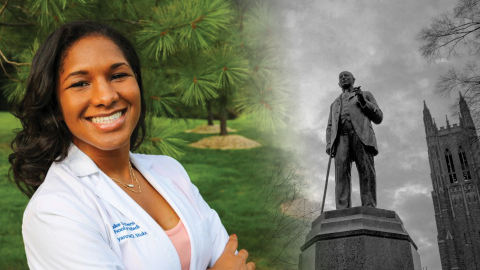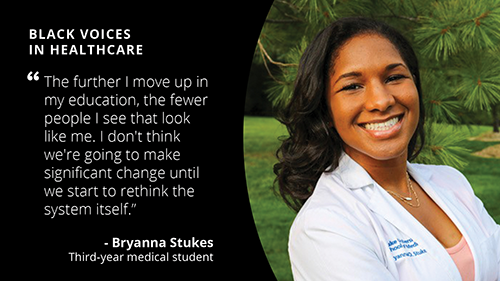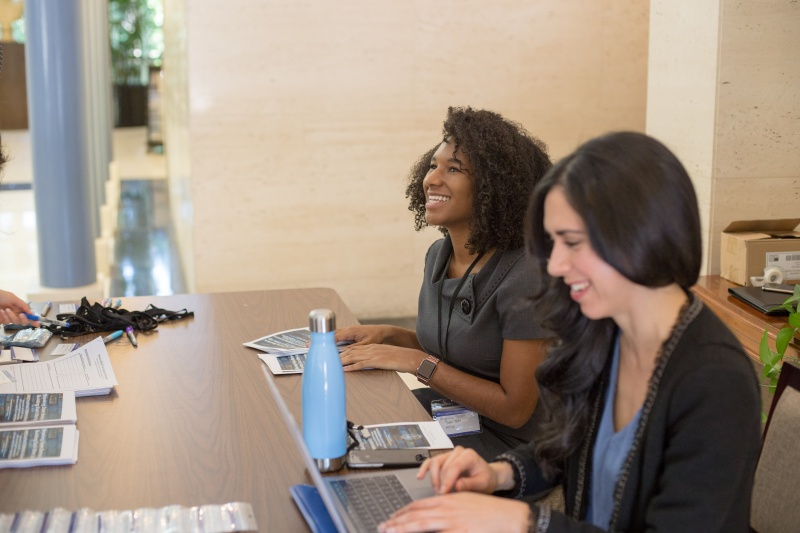
This piece is part of a series featuring Black voices from the surgical and emergency medicine communities at Duke.
About Bryanna
Bryanna Stukes was born and raised in the Washington, D.C. metropolitan area. She attained a B.A. in philosophy from Spelman College before volunteering with Peace Corps Ecuador as a public health educator. She completed her post-graduate education at Johns Hopkins in Biochemistry and Molecular Biology. Bryanna is a third-year medical student at Duke with an interest in plastic and reconstructive surgery.
Q: Could you describe what made you want to pursue a career in healthcare?
When I was 17, l loved Grey's Anatomy. It was just TV, but I wondered if it was something I really wanted to do with my life. I cold emailed about 50 surgeons in the D.C. area, and one happened to allow me to come see a procedure. I ended up staying until 10 or 11 o'clock at night, to the point where security came to get me out of an OR because my dad was downstairs at the security desk, demanding to know where I was. I thought, "Maybe I do want to do this."
I didn't meet another Black woman who was a surgeon for over a decade. It's not because I wasn't exposed to surgeons. I went to shadow people in D.C.; I went to shadow people in Maryland and in Atlanta. I tried to seek out those opportunities and sometimes I would get a surgeon who was a woman. Sometimes I would get a surgeon who was Black, but I never got a surgeon who looked like me, until I actually came to Duke and scrubbed in the OR with Dr. [Lola] Fayanju. I can't even put into words what it was like to scrub in with her for the first time, because I wasn't even conscious that that was something I was craving to see. To see a Black woman run an OR was life changing. I said to myself, "I can do that too."

Q: How would you say your own race positively or negatively affected your upbringing and life experiences thus far?
For me, it's really hard to separate anything from race. I grew up in Prince George's County, Maryland, which is one of the most affluent Black communities in the country. I went to a Black school and went to a Black church. I grew up in a Black family, a two-parent household with extended family living in the home most of my life. I was always surrounded by the Black community and I always felt encouraged and uplifted and felt love for my community.
My family encouraged me to think that education was the way out, a way to get the American dream and to have a better life. But the further I move up in my education, the fewer people I see that look like me, and the more blatant institutionalized racism becomes, the more I am able to see that all of this was built on a foundation of racism and inequity. Unless we uproot the very foundation, I don't think we're going to make it. I don't think we're going to make significant change until we start to rethink the system itself.
Q: As you look ahead to residency, what important factors are you considering?
Recent events have made me look at institutions more closely at how they handle race and how they act in this time. I've seen some institutions that are responding in a way that would make me feel I would be safe there. When I'm at an institution that I think won't speak up for me, it doesn't make me feel safe.
The language that is used is important, because it should be explicit language that speaks directly against racism, that is intentionally antiracist and antisexist. Language is important and then also the action behind it. If an institution wants diversity and wants inclusion, and wants to foster that environment, then it needs to put money and time into those initiatives, and really challenge itself to rethink medical education.
It's important to acknowledge that the medical system was not built on a foundation of equality. It was built on a foundation of racism and unfair biases. That's the foundation of this institution. If we don't acknowledge that, how can we move on? I have been seeing institutions directly call that out, and it's really inspiring to me and it makes me feel seen.

Q: This year has been a difficult one, first with COVID-19 and then with the pandemic of racism in our country. How has it affected you personally and professionally?
It's interesting, I have a very strange relationship with professionalism because I feel like professionalism has historically not been equated with Black women or the Black community. I feel like to be professional is to code switch, and change my hair, and be silent when a patient calls me the “N” word, or when I'm seeing my superior practice race-based medicine.
But as far as recent events on a personal level, I feel like it's affected my mental health a lot. I went through a period where I had nightmares, and I felt like someone was coming into my house to shoot me while I was sleeping in my bed, and that was probably related to the racial trauma of Breonna Taylor's death.
It's gotten better because of the support I have from my friends here and from my family. I think that I've been able to channel that energy into more productive things. Being back on the wards is better because it's helped me refocus and reimagine and remember why I'm here and why I want to be a physician.